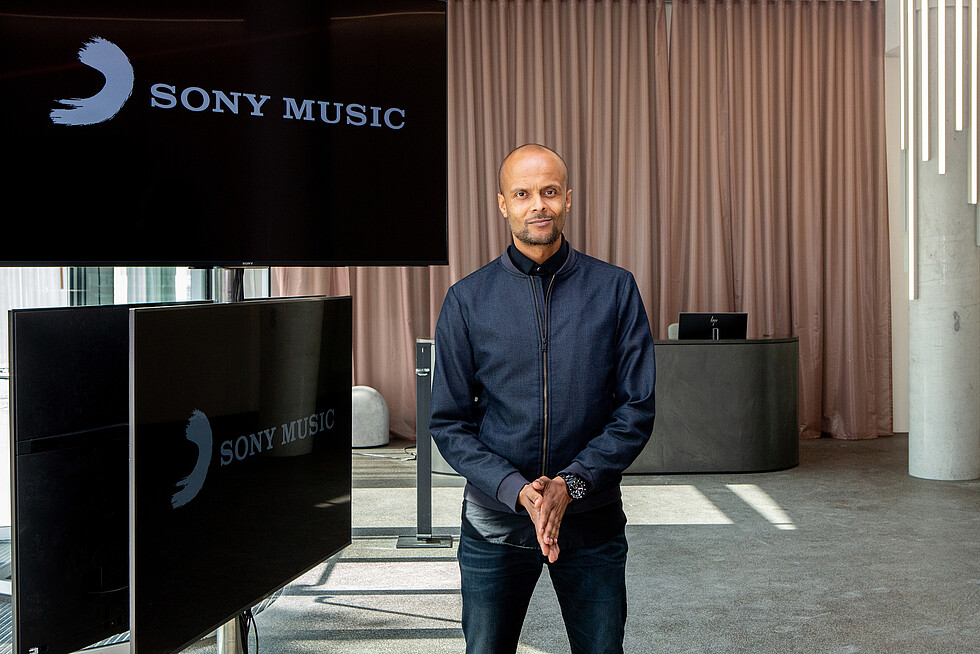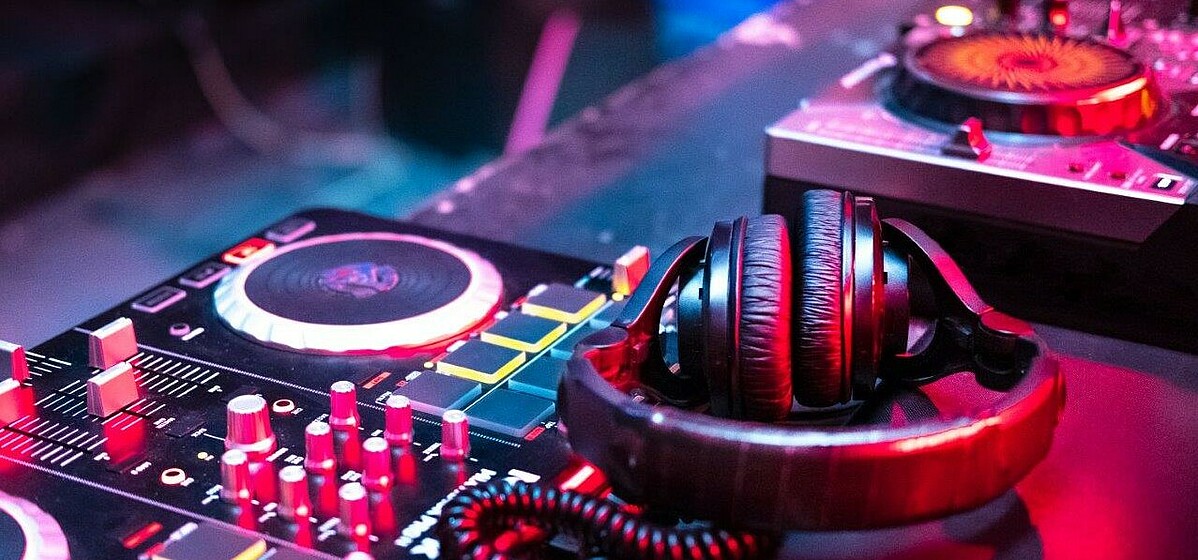“Germany’s Most Important Playground”
That’s what Sony Music’s boss calls Berlin.
Sony Music has artists under contract from AC/DC to Yo-Yo Ma, including Mariah Carey, Depeche Mode, Justin Timberlake, Daft Punk, P!nk, Shakira, Foo Fighters, Beyoncé and Bruce Springsteen, and represents music by megastars such as Bob Dylan, Michael Jackson and Elvis Presley. Sony artists famous in Germany include Die Fantastischen Vier, Annett Louisan, Andrea Berg, Peter Maffay, Ina Müller, Mark Forster and Mario Barth. Under Sony’s mighty wing are Berlin-based labels such as Four Music, RCA, Ariola, Columbia, and Epic.
Patrick Mushatsi-Kareba heads Sony Music Entertainment for Germany, Austria and Switzerland, which recently moved from Munich to Berlin. After Universal Music, Sony is the second giant music company to set up in the capital. One of the reasons: Berlin not only has the most people making music, it also has the biggest audience for music, giving life to a vibrant infrastructure for creative projects. Most of the artists with whom the labels work either already live in Berlin or come here often anyway. Proximity to the vibrant music scene and club culture allows labels to identify trends and talent more quickly. As Patrick says, “Berlin is Germany’s most important playground.”

Patrick also stated that “Berlin is the cultural and creative epicenter of Germany.” A thought his boss echoes. "I am looking forward to opening a new chapter for Sony Music in the pulsating capital Berlin, one of the most important creative centers in Europe", says Daniel Lieberberg, Sony Music's President of Continental Europe & Africa.
Though central, the area that Sony has chosen to settle in, Schöneberg, is hardly considered an epicenter of cool among Berliners. However, it does have some music clubs with a long tradition, such as the Dschungel, the Loft, and the Metropol. Furthermore, back in the 1970s this was the district in which David Bowie and Iggy Pop lived.
Sony Music’s new home, a building complex revamped by architectural studio Karhard, has seven stories and approximately 8000 square meters. Plenty of space for all of Sony’s music-related businesses, including Sony Music Classical and Sony/ATV Music Publishing. Sony also plans to open up the sound studio in their basement for workshops with local kids, and practices an open-door policy for people in the neighborhood. Newcomers are always welcome, and when the label makes a deal with promising talent, it may offer advance payments or organise brand co-ops even though the musician or band is as yet unknown.
Actually, Sony Music is not coming to Berlin but returning. Until 2004, Sony was based in the opulent Sony Center at the prestigious Potsdamer Platz, and then they moved to Munich. At the time, Sony and Bertelsmann Music Group (BMG) were under one roof. Now they are separate companies, and both are back in Berlin independently.
Berlin mayor Michael Müller is happy that Sony is here again: “Sony Music is multifaceted and creative, which suits our colorful metropolis perfectly.” For Sony, the move has strategic value in that they can “work more closely with digital innovators and political decision-makers,” (Daniel Lieberberg again).
Life Is A Club, Old Chum. Come To The Club.
Of course, Sony is not the only company in the music business in Berlin. Around 1500 firms in Berlin create or distribute music, a third of them indy labels, such as Motor Music, Piranha, Embassy of Music, K7, Get Physical, and Traumton, but also including for example Viacom’s MTV Germany or BMG Rights Management. Start-ups such as Voicd.FM, ColorsxStudios and Endel Sound profit from proximity to established international players such as Ableton, Native Instruments, MAGIX, or Holoplot. Of course, you’ll find professional studios here, well over a hundred of them, in fact, among them Hansa-Studios und TRIXX Studios. All in all, the music scene in Berlin makes close on 2 billion Euros a year.
The city has been famous for its club scene since at least the 1920s. Today the city boasts over 250 official clubs as well as some musical and variety theaters. Remember Cabaret? The tradition lives on. There are also ten renowned orchestras, two concerts halls and four operas. About 100 classical ensembles, almost 900 choirs, an estimated 1000 pop and rock bands, another 1000 jazz musicians, as well as 1200 people earning money as DJs ensure that there is always something to hear, here in Berlin.
Music media abounds too. Berlin has over 70 TV broadcasters, almost 60 radio and web stations, over 150 magazines and publishers, as well as music shops of various sorts. And there are over 150 music schools and over 40.000 people studying music-related subjects.
All in all, over 15.000 people in Berlin make a living off music. For a long link-list of all things music-related, see music in the business location center, which even features an interactive map.
Meeting Music
As you might expect, there are plenty of conferences in Berlin for the music industry. The Superbooth is a trade fair for electronic music taking place in spring 2021. The organisers also plan a fair for guitar music, SOOPERgrail. The able people behind Loop have decided to postpone the conference due to corona, but are working on digital formats to connect people and allow them to exchange ideas about the future of music.
In 2020, Most Wanted: Music 2020 (MW:M) took place in a hybrid format, with over 30 talks, workshops, Q&A sessions and panels and with over 80 international speakers. Part of the program were the „listen to berlin: Awards“, which celebrate the music scene. This year there was a „Business Prize“, which went to the solidarity platform „United We Stream“ for their innovative help for the Berlin club scene during the pandemic.
The Berlin Music Commission organises the Hybrid Music Lab, which connects the music and tech scenes. Stadt nach Acht (the city after 8pm) is an international conference and platform concerned with sustainable nightlife. CreAid Network Berlin is a connector between refugee musicians and the Berlin music industry.
Musicboard is a unique institution in Germany which funds pop music and aims to maintain a “dynamic discourse on pop music in Berlin”. Musicians benefit from scholarships, take up residencies abroad or receive funding for a tour. Programs such as Karrieresprungbrett Berlin, Pop im Kiez and Festival Funding promote innovative concepts. In 2020, Musicboard announced its new artist-based Label Funding program. There’s also Musicboard’s annual Pop-Kultur festival and Berlin’s summer event Fête de la Musique.
Berlin is also part of the Music Cities Network to foster communication, cooperation, and policies with a focus on the development of artists and businesses across the member cities, which includes places as far afield as Manchester, Reykjavik, and Sydney.
And as if all that wasn’t enough, Berlin is also home to the German MusicTech Association, whose multifarious activities are of tremendous benefit to members and the city as a whole.
Here’s a list of music events and festivals to enjoy in Berlin.
- Lollapalooza
- Club Transmediale
- Musikfest
- JazzFest
- Classic Open Air
- young.euro.classic
- popdeurope
- Karneval der Kulturen
- Fête de la Musique
For people who miss going to concerts and events, Berlin has a few solutions in the form of streaming platforms Berlin (a)live and Culture Cast. One of the benefits of such digital offers: It is not just easy to “go to” concerts, you can also give them. Living room concerts, DJ sets, online exhibitions, live readings, even classical opera - you can find it all online, by amateurs and professionals.
Text: Olaf Bryan Wielk, ideenmanufaktur
Header image: © iStock, Valery Ambartumian

